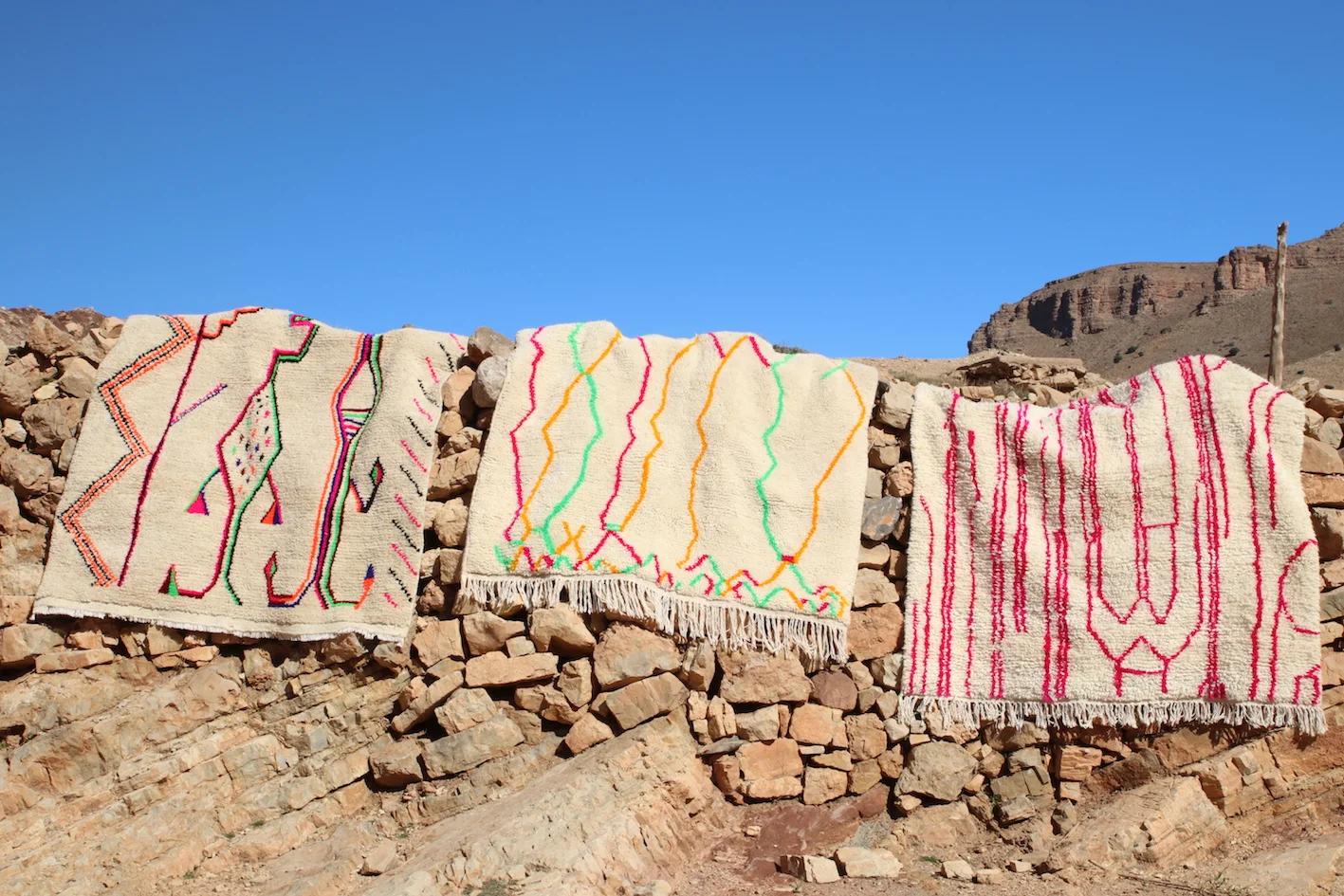MARION Pelouzet, FOUNDER OF THEM
At THEM, the only "stars" are the craftswomen and men, and their creations that are steeped in rich history and traditional skills. Too often left behind the scenes, THEM is designed to place these artisans and their work centre stage. THEM offers custom made Berber rugs but through a fair approach for the artisan and a fair price for consumers.
Looking for a better balance, Founder Marion Pelouzet restructured the sales channels of the Berber rug. Every year, Marion makes several trips to their source, the tiny Berber villages in the Middle Atlas mountains, in order to seek out Béni Ouarain rugs with their graphic shapes, Azilal rugs with their vibrant colours, some rare Boujad rugs. Working directly with the craftswomen of the beautiful Moroccan mountains, the craftsmen and women in all the little family workshops, who are truly passionate about their skills. Very often, they have learned their trade from their parents, and intend to pass it on to their children.
THEM seeks to be involved, enable fair working and price and preserve the inherited artisan skills from the Indigenous peoples of Colombia, the women weavers of Morocco, the dyers of Mail - all have golden hands and are too often not recognised for their amazing work. THEM seeks to bring them back centre stage.
TELL US ABOUT YOURSELF AND THEM?
My name is Marion and I’m the Founder of the e-concept store THEM. I worked as Marketing Manager for jewellery and fashion brands before founding THEM. I have always been in love with an object with a story. For a very long time I wanted to find a concept that highlighted artisans and their traditional crafts from around the world. During the summer in 2017, I travelled to the Amalfi Coast in Italy and met many ceramists. I sought their interest if I created a concept store (THEM) and they were all very interested. I returned to Paris and one week later I left my job. THEM was born and I never looked back!
What do you love most about THEM?
The buying! I love being in contact with craftsmen and craftswoman - I have such respect for them and their talent. By the way, that’s why THEM is named THEM! It is a dedication to the exceptional artisans that I work with. From the artisans in the Middle Atlas mountains in Morocco to the Indigenous people from Colombia and the local weavers in the Phillipines. These people live in very isolated, remote small villages whether it be in the mountains or the jungle - their life is very simple. Not modern at all. But they have so much to teach us. That’s incredible! They know everything about their rounding nature and I truly love that!
What inspireS YOU AND WHAT YOU DO?
Everything! My eyes are always wide open everywhere. But…the best inspiration comes when I am travelling. It was a trip to Colombia that first saw the concept for THEM born, and my second trip to Italy was the moment I decided to launch THEM. My third trip to Morocco was when I achieved THEM. Travel is my oxygen. That’s the time I take for me. Time to think. When I am most creative and inspired.
Can you tell us more about the collection?
I don’t talk about a collection because I don’t see THEM as a brand. I see THEM as a curator of worldwide craftsmen. A platform to share their work and do it the right way.
My goal is to seek out handmade and rare decoration objects like ceramics and berber rugs and to learn about the technique behind the product, the story and the symbol of the product, as well as the story of the local people who create the pieces.
I want to share their incredible knowledge and skills that is steeped in tradition passed on through many generations - I want my customers to understand and appreciate these people, their story, their skills and their products.
What was the drive behind creating THEM?
At THEM, the only "stars" are the craftswomen and men, and their creations that are steeped in history. Too often left behind the scenes. I designed THEM to place them centre stage. To highlight the artisans and their know-how was my first motivation. The second one was an economic driver.
Most of the time, stores which are selling handcrafted products don’t buy the product directly from the artisan. For example, berber rugs are often bought at decoration fairs like Maison & Objets in Paris or in the souk from Marrakech. So, there are a lot people in between the artisans and the customers. For each person involved the final price increases. This means that customers don’t buy handmade products at the right price and the store doesn’t know the actual salary of the artisans.
It is not a fair price.
What advice do you have for emerging designers?
Work hard. Have a good work ethic and be sincere.





